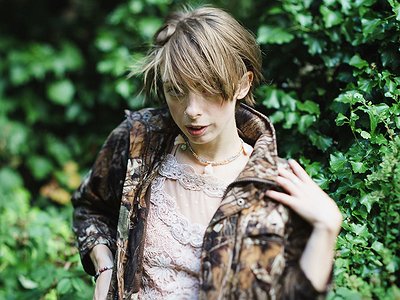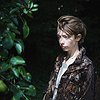Part 1
Name: Elsa Hewitt
Nationality: British
Occupation: Producer
Current release: Elsa Hewitt's new album Lupa will be released on Cargo on April 30th.
Recommendations:
Jakoby - Arc ( + artwork by Oliver Pitt who makes many of Kirk Barley’s album covers)
Daisy Dickinson - aspects of awakening
Mark Hewitt - Les Coffrets
If you enjoyed this interview with Elsa Hewitt visit her homepage for more information. She also has a Facebook, Soundcloud and Instagram account.
When did you start writing/producing music - and what or who were your early passions and influences? What was it about music and/or sound that drew you to it?
I wrote my first songs in primary school purely for fun, because my friends and I needed songs for our girl group. It wasn’t until I started playing guitar around age 13 that it occurred to me how natural it was. It quickly became important to me because it allowed me to express myself at a time when I’d really lost the ability to speak or communicate my feelings. it also helped me establish my identity which is what I needed to survive school. Music was so trustworthy and it brought me a deep satisfaction and sense of security that I hadn’t found anywhere else.
I grew up around my parents’ diverse music taste which included minimalism, experimental and avant-garde bands, jazz, blues, they were apparently listening to a Jon Hassell tape during my birth … This mixed with my early interest in 60s bands, early blues and baroque, with later influences of 90s pop and various singer-songwriters.
For most artists, originality is preceded by a phase of learning and, often, emulating others. What was this like for you: How would you describe your own development as an artist and the transition towards your own voice?
I learnt to read music through recorder and flute lessons, I then also learnt guitar for seven years and drum kit for a short period. I also grew up with a mother who sang cabaret, blues, choral and international musics, and did ‘music & movement’ for kids for a long time. I was incredibly unenthused by music theory and learning compositions though. I learnt music technology at college and that was the last of any formal education. Everything else was self-taught, and songwriting was instinctive.
There came a point when I just had things to say that I could only express in the form of songs, so finding my voice wasn’t something I even thought about. In the early days I emulated grunge and leftfield singer-songwriter figureheads like PJ Harvey, Frank Black and Kurt Cobain. I wrote so much and recorded from the start, so my senses developed rapidly. I didn’t consider myself a singer but was confident in my writing, my voice followed the development of my ears, mind and identity.
For many years I deliberately mumbled my words, people would always tell me to sing louder and enunciate, but that was a change that would only come from changes deep within myself.
How do you feel your sense of identity influences your creativity?
In a way they are inextricably linked, since creation is what gives my life meaning, and I can only write from my own experience. I need music to express myself in a way that feels 100% faithful. I am interested primarily in exploring subtle energy and mystery, which takes precedence over the assertion of my own beliefs. These days I aspire to make music that can be felt deeply and universally. I find the idea of a persona quite unhelpful for creativity.
What were your main creative challenges in the beginning and how have they changed over time?
At the beginning the challenge was working out how to record my music. Later it would be a challenge to keep my projects from overcomplicating. Recently the challenge has been learning to mix, which may have been to the detriment of my first electronic albums, but ultimately I’m glad I chose to fine-tune my ears over time as it’s interesting how it interlinks with self-discovery and restoring balance psychologically.
As creative goals and technical abilities change, so does the need for different tools of expression, be it instruments, software tools or recording equipment. Can you describe this path for you, starting from your first studio/first instrument? What motivated some of the choices you made in terms of instruments/tools/equipment over the years?
I recorded my first demos and albums on an MT400 four track that my dad had bought from a catalogue in the hope that one of us would use it. I invented weird recording techniques to degrade the sound and create textures or effects, such as recording through a dictaphone through a guitar amp, using the reverb and eq on that.
After clinging to guitar for many years and creating arrangements through working with my bands, I left home and started writing songs with a synth which also allowed me to program beats and create setups for playing live. This suited my development in music taste and lifestyle. I had always liked writing the odd song on piano because my unfamiliarity with it created many avenues of exploration, so synth was a natural progression both sonically and creatively.
Each new piece of equipment has brought an entirely new dimension into my process.
Have there been technologies or instruments which have profoundly changed or even questioned the way you make music?
The incorporation of a loop pedal prompted me to start layering my own playing and singing. This was followed by the sampler and Ableton which probably sparked the biggest change. I started resampling my own songs which was like a fun revolution after spending so many years slaving away over difficult guitar parts and singing at the same time.
Using electronic equipment was quite liberating in that way. I’ve always adored rhythm so by the time I started making beats I was really craving the means to do so.
Collaborations can take on many forms. What role do they play in your approach and what are your preferred ways of engaging with other creatives through, for example, file sharing, jamming or just talking about ideas?
Sometimes a simple discussion will motivate me to go and make a track, based on the concepts we talked about. It could be about time signatures, plugins or different ways to start something. I’ve done file sharing collaborations but I get a lot more out of actually playing music together in person, which can be a really exhilarating experience, building something together in the energy of the moment is quite beautiful.
Take us through a day in your life, from a possible morning routine through to your work, please. Do you have a fixed schedule? How do music and other aspects of your life feed back into each other - do you separate them or instead try to make them blend seamlessly?
I have routines that I know are healthy and productive, but I tend more to just go with the flow. I enjoy having structure, I just struggle to keep things the same as I also need variation.
Days that start with yoga often go well. Even if my routine is totally fluid, I always know what needs to be done and I get it done. I love days when I start a song in the morning and have finished it by the end of the day. Everything else has to fall by the wayside for that to happen but if I’m excited by a project it occurs naturally.
These days I just follow my natural rhythms, responding to my needs. I believe that if I create beautiful life experiences, my music will contain that same beauty. For that I rely on a self-care routine which consists of activities like yoga, dance, meditation, rest, nature, walking, writing, bathing. These things lead me to feel centred, focussed and filled with vitality, which is ideal for getting work done.






